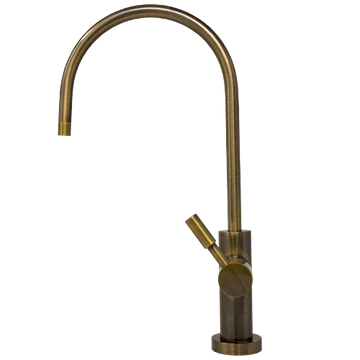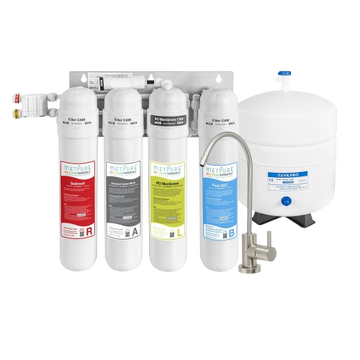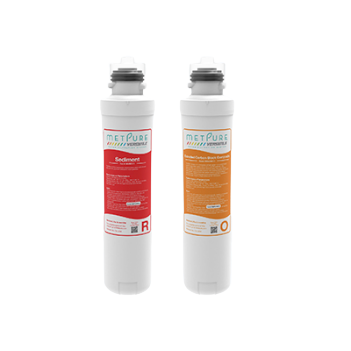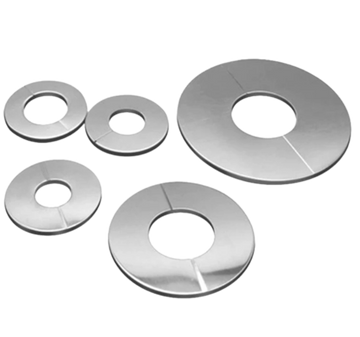In today’s world, accessing clean and safe drinking water is becoming more critical and challenging. Water, one of the most significant substances on the planet, covers 71% of our planet’s surface and almost 75% of the human body. From science and medicine to agriculture, transportation, and food processing, water is crucial—and most importantly, drinking.
However, of this 71% of the planet’s substance, much of the water is undrinkable, either because it is naturally unsuitable for the human body or because of increasing contamination. This contaminated water has increased health risks and concerns for purified drinking water. Thus, effective mechanisms and solutions for water purification are as crucial as any other part of your household machines.
In contemporary markets, the increased need for water filtration solutions has prompted the development of sustainable and efficient solutions - advanced systems that combine cutting-edge technology with convenience and are designed to deliver clean and purified water. Both traditional and modern water filtration methods are in use and are essential products in the water filtration market. This article discusses water filters for households, their usage, and their role in purifying drinking water.
Where Does Drinking Water Come From?
For many people, drinking water is sourced from a municipal supply that treats it to purify it. It is supposed to be safe to drink but often contains the odors or tastes of chemicals used to disinfect the water from germs. Your main water supply may also contain contaminating deposits such as limescale, which damages appliances and blocks pipes.
Regardless of how the suppliers disinfect the drinking water, it may be subjected to the issues mentioned above and other water problems, making water filters necessary. People use different kinds of household filters to purify the water for their daily usage and drinking purposes, increasing the need and demand for water filters for domestic use.
Household water filters, like the Metpure Versatile Reverse Osmosis Water Filtration System, provide a robust solution for ensuring tap water is safe to drink. This 4-stage filtration system effectively purifies water by removing up to 99% of contaminants such as lead, mercury, and chloroform, thanks to its state-of-the-art RO membrane. Designed for convenience, this under-sink system features a sleek, compact design that saves space and includes easy-to-maintain quick twist filters. With its comprehensive installation kit and accessories, the Metpure system offers a seamless setup and peace of mind, delivering clean, healthy drinking water directly from your tap.
What is a Water Filter?
Water filters are tools used to purify water from potential contaminations for drinking and other purposes. They ensure clean water consumption, improve health, and avoid diseases. Water filters are used almost everywhere, from households to industries, which often access uncontaminated water for their industrial processes. Among the many methods and products used for water filtration, traditional and modern methods and products are spread across the board. Sand and Gravel filters, activated carbon filters, and ceramic filter elements are among the most renowned traditional methods, while modern technologies like Reverse Osmosis and ultraviolet sterilization techniques are at the top of the list.
What are Household Water Filters?
Water filters are designed to remove and clean water of impurities such as viruses, bacteria, hardness, sediment, and even odors or unpleasant tastes to release clean and purified water. They work as a physical barrier that traps or blocks debris like sand or bacteria, separating them from the water. Among the many types of water filters available in the market, there are filters with different barrier gap sizes or membranes that affect the amount or size of debris getting blocked and the overall flow of water from the filter.
In households, specific kinds of water filters are used that are mainly designed for domestic use. From whole-house water filters to specific-need applications, household water filters have a wide range. Buy now
Types of Household Water Filters
Most whole-house water filters use a four-step method to clean your water. A pre-filter removes large particles of contaminants first; secondly, an activated carbon and copper-zinc KDF filter disinfects the water, and then finally, the post-filter water further purifies the water. The list below presents the top household water filters.
- Mechanical Filters
- Absorption Filters
- Sequestration Filters
- Ion Exchange Filters
- Reverse Osmosis (RO) Filters
The reverse osmosis water filter is one of the top household water filters from the above-mentioned list. It removes a large percentage of impurities and contaminants that may include bacteria, which can potentially cause waterborne diseases. Home RO filters push water through the reverse osmosis membrane with pressure to disinfect it.
Do household water filters make tap water safe to drink?
Household filters, including home RO filter and purifier for tap water, purify water from all contaminants, whether large or dissolved solids or invisible bacteria. They significantly remove contaminants like chlorine, bacteria, lead, and other contaminants to improve the quality and taste of tap water. Including the use of activated carbon, reverse osmosis, and other filtration methods, they aim to almost eliminate harmful impurities from water.
However, the quality of purified water from household filters depends on several factors, such as the quality of filters and the kinds of contaminants present in the water. It also partially depends upon the maintenance and replacement of parts of filters, cartridges, or faucets, as well as the quality and maintenance of your household taps. Hence, using filtered tap water for drinking is not entirely safe or advisable.
Households and other taps are also prone to accumulating dirt or junk in their pipes or faucets, which may affect the quality of filtered water. Although purified from household filters, tap water is still not entirely safe for drinking.
Conclusion
While household water filters significantly enhance tap water quality and safety and are a crucial part of any household water supply system in today’s times, they do not purify water to the extent of producing drinkable water. So, for drinking water, it is better advised to have filters specifically designed to purify water for drinking and other food processing purposes. Choosing a filter that meets specific drinking water quality needs is crucial.
To explore all and every kind of household and other water filters, their parts, and cartridges, and to find the best RO water filter, visit Metpure retailers who will meet all your water filtration needs with the feature of customized solutions and the highest quality filter products and parts.














